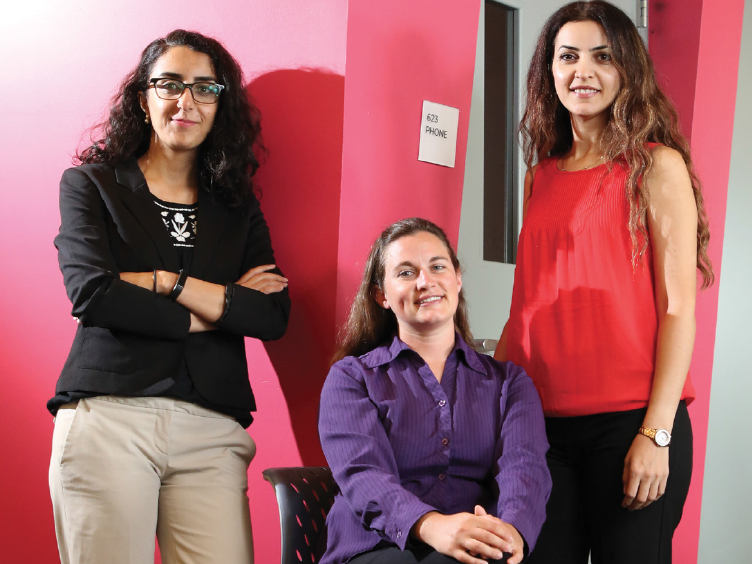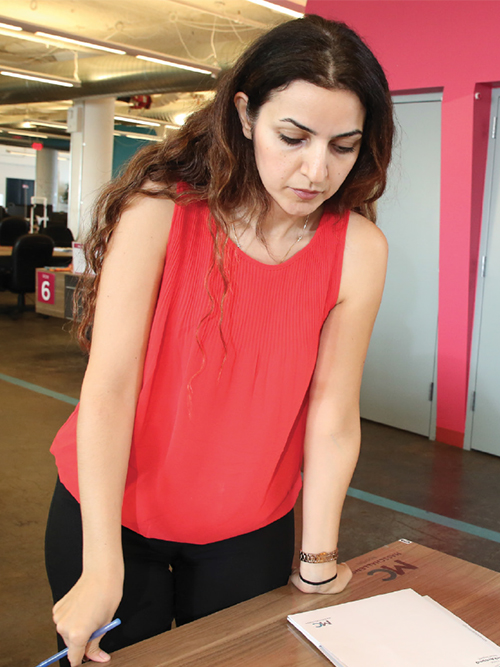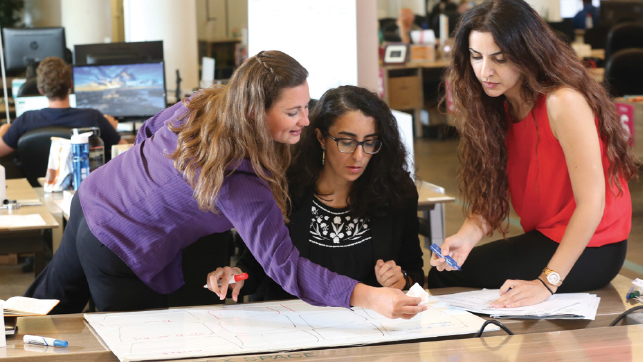
By Bethany Romano, MBA'17
Wafaa Arbash, MA SID/COEX’17, stands in front of her startup business partners, turns around and begins to practice her business pitch from memory. “Can you imagine what it would be like if half of the people in the United States had to pack up and move to a neighboring country? Doctors, engineers, teachers, students and entrepreneurs, just like you?” she begins.
“I can imagine, because I’m from Syria, where 11 million talented, educated, motivated people had to pack up and leave their country. And the problem is that now these people don’t have access to jobs because they don’t have connections to the local economy, just as you would if you had to leave your country. Meanwhile, small companies are always looking for cost-effective solutions to their repetitive, online tasks so they can focus on their strategy and long-term goals. WorkAround connects companies with online talent to complete these jobs. We save time and money, and provide quality services while giving people economic empowerment.”
“Then I drop the mic,” she grins, eliciting a laugh from her partners.
“That was great. One minute, seven seconds,” says Shadi Sheikh Saraf, MA SID/COEX’17, looking at the timer on her phone. “You’re so close.”
“Yeah, I need to keep practicing,” says Arbash.
“You’ve got the first part down, but the second half needs a little work,” suggests Jennie Kelly, MA SID/MBA’17. They have a pitch competition coming up — a big one — and the winners get a prize of free airline miles.
Together, Arbash, Sheikh Saraf and Kelly have brought WorkAround out of the Heller classroom and into the real world. “WorkAround was born at Heller,” laughs Arbash, a Topol Fellow in Nonviolence Practice, who first came up with the idea while conducting her master’s research. “I was thinking about what could be done to help refugees and displaced people. There are so many organizations doing a lot of good work to help refugees, but a lot of them focus on donating more and more aid, which is not a sustainable solution. I kept thinking about all of my friends and the people I know who left Syria, all of these people who are talented and educated and motivated to do something with their lives, but they’re stuck.
“At the end of the day, what really matters is economic empowerment. I just felt like this was where we had to help people. At the same time, I found that companies are always looking for cost-effective solutions to their online repetitive tasks and jobs. It’s expensive for them to hire someone here in the U.S. to do these jobs, so they outsource this work.”
She started talking to people in the Boston business ecosystem, asking if they’d hire these people to do jobs like photo tagging, data entry, translation and transcription. They said yes, as long as the price is right and the work gets done. Then she started to research and confirmed what she suspected: According to the U.N., 75 percent of refugees in the Middle East and Northern Africa can access 3G Internet or faster, and 44 percent have at least some college education. “That’s how this all started, by finding two problems that exist side by side and connecting them,” she says.
Arbash quickly teamed up with Heller classmates Jennie Kelly and Shadi Sheikh Saraf and Brandeis undergraduate student Shai Dinnar ’18 at the 2016 Heller Startup Challenge. The team developed Arbash’s business idea into a more concrete plan, pitched it to a panel of judges and took home first prize.
After the Heller Startup Challenge, they participated in the Lean LaunchPad program at Brandeis University’s Hassenfeld Family Innovation Center, where they refined their model and growth strategy and won a SPARK grant. Next, it was the Brandeis International Business School’s three-day startup (3DS) challenge — they won that, too. Then they won the Kauffman Foundation’s startup boot camp for entrepreneurs from underrepresented groups.

Those last two wins secured them a spot in the second round of judging at MassChallenge, a prestigious startup accelerator and competition located in downtown Boston. Of the 360 teams in round two, 128 moved forward as finalists, and WorkAround was one of them. Throughout their journey, the WorkAround team has navigated incredibly complex problems. From international banking regulations and currency to building an appropriate online platform, the group has tackled each issue — and they remain standing.
“Looking back over what we have achieved in less than a year, we’ve had some big wins,” says Arbash.
Heller MBA Program Director Carole Carlson agrees. “This team did outstanding work developing a great idea into an initiative that is poised to have real impact. What really impressed me was how well they leveraged resources and support at Heller and Brandeis to develop their concept. WorkAround is a great example of the kind of innovative high-impact social enterprise that can really make a difference, and we are thrilled that Heller was able to support the development of the organization,” she says.
“Being at MassChallenge has been great,” says Kelly, “because we all came from Heller, which has such an extensive community of support. If we had left Heller and tried to do this on our own, with no community, that would have been so hard. But being surrounded by other entrepreneurs who are going through similar things we’re going through is worth its weight in gold.”
At present, WorkAround has relationships with several client companies who need to outsource repetitive, online tasks, such as providing human input for machine learning and artificial intelligence systems. They have also registered over 270 workers in their system — all of them refugees and displaced people from nine origin countries living in 30 new host countries.
“We haven’t had to do a lot of outreach to workers,” says Kelly, who manages WorkAround’s operations. Over 250 workers registered on their site as a result of a single Facebook post by Paper Airplanes, a partner organization that works with people affected by conflict. So far, they haven’t had to advertise further.
“We’re still working out the bugs right now, so we’re not trying to attract more workers just yet. Once they register, they agree to some terms and fill out a quick survey that gives us a sense of their abilities. We then take that information and set people up to work on certain tasks. Once they’re ready, they can log in to the platform and work as much as they want, whenever they want, as long as there is work to be done.”
Workers can always let the team know that they don’t have time for a job this week, or if they really only want to do a certain type of work, such as translation. The system is set up to be completely voluntary and gives workers preference.
“It’s great fun, but it’s a lot of responsibility,” says Kelly. “Being in touch with all of these people — they often tell me about their circumstances or why these jobs are so important to them, and I really feel like we have a responsibility for this business to succeed and keep providing them with work. People are depending on us.”

It’s a lot of pressure, but it also makes the team proud to know that they’re making a difference for people. “Instead of feeling like a burden to society, these people can use their skills and talents to be helpful to themselves and to the community that is hosting them,” says Sheikh Saraf, a Social Policy and Coexistence Fellow. “They have the skills and the talents, but they don’t have the opportunity. WorkAround gives them that opportunity, and helps them feel that they are someone, that they have dignity, that they are useful.”
At its present size, WorkAround is functional, but not profitable. “Right now, WorkAround needs full-time attention to grow and scale, but we also have to pay rent and buy food. We will need investment soon, or we’ll have to seek individual employment elsewhere and only work on this part-time, meaning that the business will not get as much attention from us,” says Arbash.
The team’s current goal is to successfully pitch to investors, which would allow them to work on the business full time and bring it up to scale. Outside funding would also allow them to automate a lot of their processes, hire back-end web developers to refine their online platform and abandon the third-party software they’ve been bootstrapping for their needs. They’re also working hard to attract more client companies, in order to provide a variety of steady work opportunities to their current pool of registered workers. One good sign, they note, is that nearly all of their current client companies are repeat customers. They’ve been happy with WorkAround’s services and willing to continue hiring their workers.
In October, Arbash carried the team to another monumental win: WorkAround won first place in the Beantown Throwdown, a prestigious startup competition held as part of HUBweek by the MIT Enterprise Forum of Cambridge. They outcompeted 11 other teams from local universities, including Harvard, MIT, Tufts and Boston University. The prize includes legal and marketing communications services and a guaranteed place at the MIT Enterprise Forum Cambridge Startup Spotlight event in June 2018.
With all of this positive feedback and the support they’ve gained from the Heller School and MassChallenge, Arbash and her team are optimistic that attaining outside investment is possible. She practices her pitch all the time — at every opportunity — and she’s confident that the Work- Around business model is strong. The team’s ultimate goal is to provide a reliable employment option for workers whose lives have otherwise been anything but stable, in a context that respects the dignity and valuable skills of refugees.
If the startup team is able to secure outside investment for WorkAround, Arbash says, “I’m 100 percent willing to take the risk. We know we can take this business to the next level. I know there’s potential here, and we’re not willing to turn our backs on these people.”
This article originally appeared in the Winter 2017 issue of Heller Magazine.
